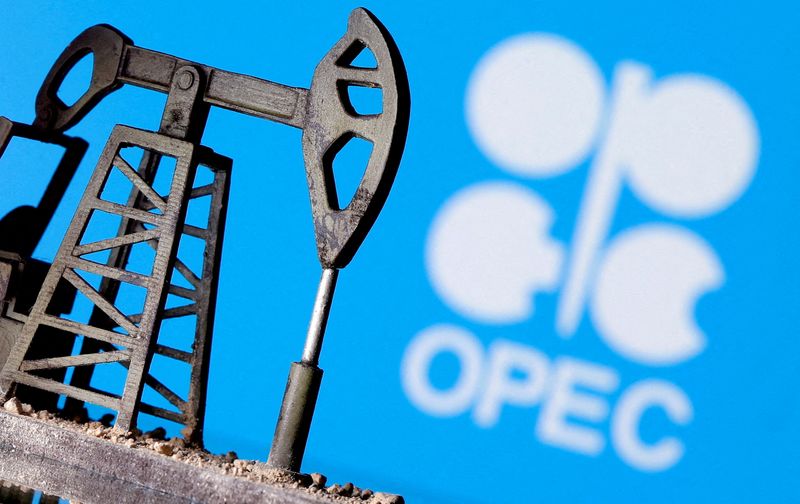By Timothy Gardner
WASHINGTON (Reuters) -A U.S. Senate committee is expected to pass a bill on Thursday that could open members of the Organization of the Petroleum Exporting Countries and its partners to antitrust lawsuits for orchestrating supply cuts that raise global crude prices.
The No Oil Producing and Exporting Cartels (NOPEC) bill is intended to protect U.S. consumers and businesses from engineered spikes in the cost of gasoline and heating oil, but some analysts warn that implementing it could also have some dangerous unintended consequences.
Here are some details about the bill.
WHAT IS THE NOPEC BILL?
The bipartisan NOPEC bill https://www.congress.gov/bill/117th-congress/senate-bill/977 would change U.S. antitrust law to revoke the sovereign immunity that has long protected OPEC and its national oil companies from lawsuits.
If signed into law, the U.S. attorney general would gain the ability to sue the oil cartel or its members, such as Saudi Arabia, in federal court. Other producers like Russia, which works with OPEC in wider group known as OPEC+ to withhold output, could also be sued.
It is unclear exactly how a federal court could enforce judicial antitrust decisions against a foreign nation. But several attempts at NOPEC over more than two decades have worried OPEC's de facto leader Saudi Arabia, leading Riyadh to lobby hard every time a version of the bill has come up.
The Senate Judiciary Committee is expected to pass the most recent version of the bill on Thursday.
To become law, the bill would then have to pass the full Senate and House and be signed by the president.
The White House has not indicated whether President Joe Biden supports the bill, and it is not clear whether the bill has enough support in Congress to get that far.
WHAT'S CHANGED NOW?
Previous versions of the NOPEC bill have failed amid resistance by oil industry groups like the American Petroleum Institute.
But anger has risen lately in the U.S. Congress about soaring gasoline prices that have helped fuel inflation to the highest level in decades, raising the chances of its success this time.
OPEC producers have rebuffed requests by the United States and allies to open the oil taps by more than gradual amounts as global consumers emerging from the COVID-19 pandemic and Russia's invasion of Ukraine keep oil prices boiling.
Russia, which typically has produced about 10% of the world's oil, could see crude output drop as much as 17% this year as Moscow struggles with Western sanctions.
POTENTIAL BLOWBACK
Some analysts said that rushing a bill through could lead to unintended blowback, including the possibility that other countries could take similar action on the United States for withholding agricultural output to support domestic farming, for example.
"It's always a bad idea to make policy when you are angry," said Mark Finley, a fellow in energy and global oil at Rice University's Baker Institute and former analyst and manager at the Central Intelligence Agency.
OPEC nations could also strike back in other ways.
In 2019, for example, Saudi Arabia threatened to sell its oil in currencies other than the dollar if Washington passed a version of the NOPEC bill. Doing so would undermine the dollar's status as the world's main reserve currency, reduce Washington's clout in global trade, and weaken its ability to enforce sanctions on nation states.
The kingdom could also decide to buy at least some weapons from countries other than the United States, hitting a lucrative business for U.S. defense contractors.
In addition, the kingdom and other oil producers could limit U.S. investments in their countries or simply raise their prices for oil sold into the United States - undermining the basic aim of the bill.
The United States and its allies are already facing big challenges securing reliable energy supplies, said Paul Sullivan, a Middle East analyst and non-resident senior fellow at the Atlantic Council's Global Energy Center. "The last thing we need to do is to throw a grenade into this."
U.S. OIL INDUSTRY OPPOSED
The top U.S. oil lobby group, the American Petroleum Institute, has also come out against the NOPEC bill, saying it could hurt domestic oil and gas producers.

One industry concern is that NOPEC legislation could ultimately lead to overproduction by OPEC, bringing prices so low that U.S. energy companies have difficulty boosting output. Saudi Arabia and other OPEC countries have some of the world's cheapest and easiest reserves to produce.
A wave of oil from OPEC producers, even at a time of concerns about Russian supply, "could chill drilling activity in the U.S. oil patch, potentially putting both domestic energy security and domestic economic recovery at risk," said ClearView Energy Partners, a nonpartisan research group in a note to clients.